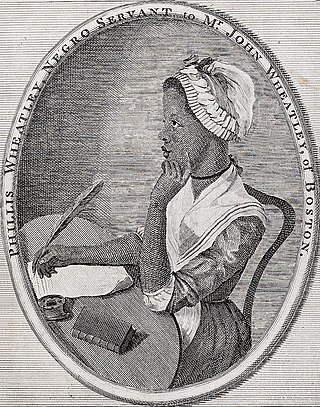Related Research Articles

Phillis Wheatley Peters, also spelled Phyllis and Wheatly was an American author who is considered the first African-American author of a published book of poetry. Born in West Africa, she was kidnapped and subsequently sold into enslavement at the age of seven or eight and transported to North America, where she was bought by the Wheatley family of Boston. After she learned to read and write, they encouraged her poetry when they saw her talent.

Dame Carol Ann Duffy [] is a Scottish poet and playwright. She is a professor of contemporary poetry at Manchester Metropolitan University, and was appointed Poet Laureate in May 2009, resigning in 2019. She was the first female poet, the first Scottish-born poet and the first openly gay poet to hold the Poet Laureate position.

Kwame Senu Neville Dawes is a Ghanaian poet, actor, editor, critic, musician, and former Louis Frye Scudder Professor of Liberal Arts at the University of South Carolina. He is now Professor of English at the University of Nebraska-Lincoln and editor-in-chief at Prairie Schooner magazine.
Nationality words link to articles with information on the nation's poetry or literature.
Nationality words link to articles with information on the nation's poetry or literature.
Nationality words link to articles with information on the nation's poetry or literature.
Nationality words link to articles with information on the nation's poetry or literature.
Nationality words link to articles with information on the nation's poetry or literature.
Chris Emery, also known as Chris Hamilton-Emery, is a British poet and literary publisher.

Anatoly Kudryavitsky is a Russian-Irish novelist, poet, editor and literary translator.
Allison Adelle Hedge Coke is an American poet and editor. Her debut book, Dog Road Woman, won the American Book Award and was the first finalist of the Paterson Poetry Prize and Diane DeCora Award. Since then, she has written five more books and edited eight anthologies. She is known for addressing issues of culture, prejudice, rights, the environment, peace, violence, abuse, and labor in her poetry and other creative works.
Angela Readman is a British poet and short story writer.

Fiona Ruth Sampson, is a British poet and writer. She is published in thirty-seven languages and has received a number of national and international awards for her writing. A former musician, Sampson has written on the links between music and poetry, and her work has been set to music by several composers. She has received several prizes for her literary biographies and poetry. Notably, Sampson received a MBE for services to literature in 2017.
Mildred Kiconco Barya is a writer and poet from Uganda. She was awarded the 2008 Pan African Literary Forum Prize for Africana Fiction, and earlier gained recognition for her poetry, particularly her first two collections, Men Love Chocolates But They Don't Say (2002) and The Price of Memory: After the Tsunami (2006).

Salena Godden is an English poet, author, activist, broadcaster, memoirist and essayist.

Bernardine Anne Mobolaji Evaristo, is a British author and academic. Her novel Girl, Woman, Other, jointly won the Booker Prize in 2019 alongside Margaret Atwood's The Testaments, making her the first woman with Black heritage to win the Booker.

Sepideh Jodeyri is an Iranian poet, literary critic, translator and journalist living in Washington DC, United States.
Shamshad Khan is a widely anthologised Manchester-based poet.

James Berry, OBE, Hon FRSL, was a Jamaican poet who settled in England in the 1940s. His poetry is notable for using a mixture of standard English and Jamaican Patois. Berry's writing often "explores the relationship between black and white communities and in particular, the excitement and tensions in the evolving relationship of the Caribbean immigrants with Britain and British society from the 1940s onwards". As the editor of two seminal anthologies, Bluefoot Traveller (1976) and News for Babylon (1984), he was in the forefront of championing West Indian/British writing.
Phillippa Yaa de Villiers is a South African writer and performance artist who performs her work nationally and internationally. She is noted for her poetry, which has been published in collections and in many magazines and anthologies, as well as for her autobiographical one-woman show, Original Skin, which centres on her confusion about her identity at a young age, as the biracial daughter of an Australian mother and a Ghanaian father who was adopted and raised by a white family in apartheid South Africa. She has written: "I became Phillippa Yaa when I found my biological father, who told me that if he had been there when I was born, the first name I'd have been given would be a day name like all Ghanaian babies, and all Thursday girls are Yaa, Yawo, or Yaya. So by changing my name I intended to inscribe a feeling of belonging and also one of pride on my African side. After growing up black in white South Africa, internalising so many negative 'truths' of what black people are like, I needed to reclaim my humanity and myself from the toxic dance of objectification." She has also said: "Because I wasn't told that I was adopted until I was twenty, I lacked a vocabulary to describe who I am and where I come from, so performing and writing became ways to make myself up." As Tishani Doshi observes in the New Indian Express: "Much of her work is concerned with race, sexuality, class and gender within the South African context."
References
- ↑ British Council Literature. Retrieved 3 June 2008. Archived 4 January 2011 at the Wayback Machine
- ↑ Poetry International Web - South Africa. South Africa Poetry International Archived 6 March 2007 at the Wayback Machine